Contents
About the Book
The liver handles hundreds of different reactions and its health affects every single part of your body. It may be the silent cause behind almost any symptom or health problem you may have and it can be in trouble even before you find yourself feeling liverish or jaded either in general, or after rich foods or a heavy drinking session. If you suffer from chronic fatigue or headaches, allergies or canidiasis, high blood pressure or PMS, hypoglycaemia, or mood swings, menopausal problems or osteoporosis this could be the breakthrough you've been looking for. The Liver Detox Plan offers an easy-to-follow clean-up plan to leave you feeling fresh and revived and ready to start again! By following a 4 or 8-week-plan you can achieve greater vitality, energy, weight-loss (if desired) and repair the damage of your past lifestyle.
About the Author
Xandria Williams has been in practice for more than 20 years in Sydney and London. She has lectured extensively in biochemistry and nutrition at conferences and to natural therapy colleges. Xandria appears frequently on television and radio and her books include Living with Allergies, Whats in My Food?, Choosing Health Intentionally, Choosing Weight Intentionally, Beating the Blues, Youre not Alone, Fatigue and Overcoming Candida.
Introduction
I gave considerable thought to the sequence in which the contents of this book would be presented. Initially I favoured a logical and evolving approach, telling you first of all about the liver and what it does when it is healthy, then covering the various things you could be doing and substances you could be consuming that could harm it; this would have led logically on to a discussion of what happens when it goes wrong and the various and many consequences to the health of the rest of your body when it does. By then, I hoped, you would have a full understanding as to the way in which many of your current health problems may not be localised problems but may stem from, or be worsened by, an unhealthy liver and a toxic system. At this point, I told myself, you would be so enthused with an understanding for what is happening in your body and the desire to make positive changes that you would willingly enter into the Liver Detox Plan and, moreover, be prepared to stick to it, even when the temptations to digress mount. So in the second half of the book I was then going to give you the full details of the Liver Detox Plan.
But lifes not like that. After some careful thought I recognised that many people are not going to sit down and read a book of this sort from cover to cover. You are more likely to dip into it, find something that catches your immediate attention and then want to know what you should do about it, now, so that you can then get on with the rest of your life, feeling healthier and more energetic. For this reason I have rearranged the book into its present format.
You will find, in the next few pages, a broad and sweeping description of what the liver does and the harm you may be suffering if your liver is not as healthy as it should be. Immediately after that comes the programme itself and the information you will need to put it into practice. Only after that, in Section 2, is more detailed information given as to what the liver is, what it does, what harms it and why the suggestions in the programme are being made and the various foods, supplements and remedies being recommended.
Whatever you do, this programme will improve the health of your liver, and that in turn will improve your overall health, well-being and longevity. So lets get started.
 SECTION 1
SECTION 1 
 Part I
Part I 
Overview of the Livers Role
When, as a biochemist, I first became interested in naturopathy and started talking to naturopathic practitioners it struck me that they had an obsession with finding out about peoples bowels and their stools that was bordering on the absurd. It made little sense to me then, since what little I knew of the medical profession told me that doctors had no such preoccupation. However, as soon as I started to study the subject myself, I realised just how vital it is that the digestive tract is in perfect working order since it is the system that delivers nutrients from the food you eat into the bloodstream. I even came to think it was the medical profession that was absurd for not taking more interest in the subject, since without a healthy digestive tract, no matter how good your diet, you will be undernourished. The stool, its nature and frequency, gives an indication, one among many, of how well your digestive processes are functioning. As both a naturopath and a nutritionist I have since developed a particular enthusiasm for working with and correcting digestive problems. That is commonly a first step to developing good health and well-being.
The next step, running a very close second, is to realise how important your liver is. It is a vital part of your digestive system, but it is also much more than that. It is, if you like, the receiving and processing plant that takes the food, delivered via your digestive tract, works it over, repackages it and then ships it out to the rest of your body for use. This may be for energy production, it may be for protein building. It may be glucose to boost your blood sugar level or vitamins for your cells. It may be repackaged fats so you can deliver cholesterol to nerve and brain cells, or rearranged amino acids so you have the specific ones you need. It may be iron in a form in which it can be delivered to the bone marrow for the formation of new red blood cells. In all these actions, and hundreds more like them, the role of your liver is vital.
There is no system or part of your body that does not depend to some extent on the function of your liver or that may not be adversely affected if your liver is unhealthy, under-functioning or toxic. It is part of your immune system, it is both an exocrine (external) and endocrine (internal) gland and plays many roles in your endocrine or hormone system. On top of all that, your liver is an essential component, if not a pivotal player, in dealing with toxins in your body either breaking them down into safer substances or eliminating them from your body, either as they are, or repackaged into a safer form. If all else fails, your liver will even store toxins itself, to protect the rest of your body. However after a while, this act of generosity leads to liver damage and the rest of your body will suffer anyway.
Because of this amazing and central role that your liver plays, it becomes extremely important, in dealing with any health problem, to consider the state of your liver and the role it may be playing in both causing and trying to resolve the problem. Lets look at what the liver does in slightly more detail.
As a vital part of your digestive system, the liver secretes bile, without which you cannot digest fats. Faulty fat digestion can lead to associated problems with digestion in general, affecting proteins and carbohydrates as well as the fats. How can you tell whether this is happening? If you find that fatty foods disagree with you, make you feel nauseous or even bloated, this may be your problem. You may also find that your stools are pale in colour, since the colour comes from the bile pigments, or that they float or, in severe cases, that there is obvious fat in them and they stick to the pan and become difficult to flush away.
Next page
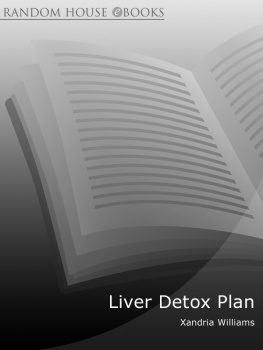

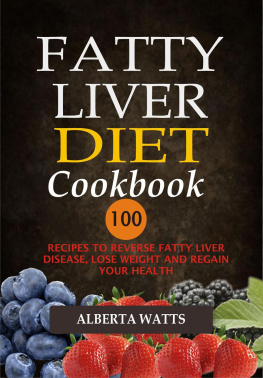

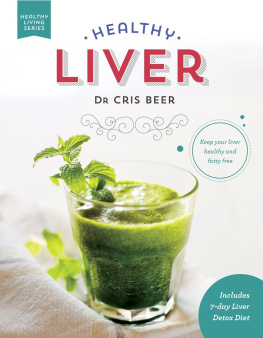
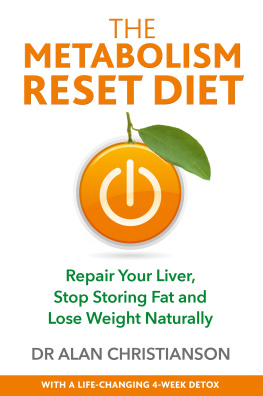
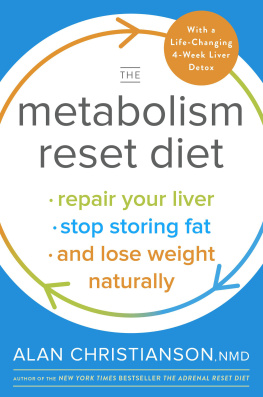


 SECTION 1
SECTION 1  Part I
Part I 